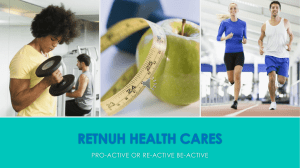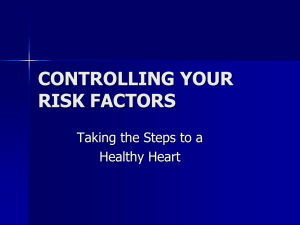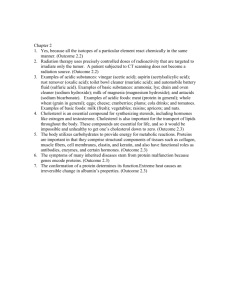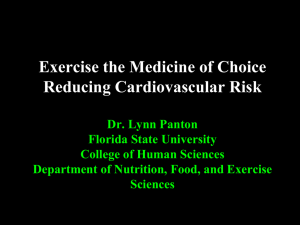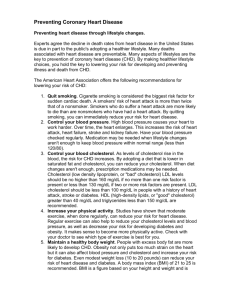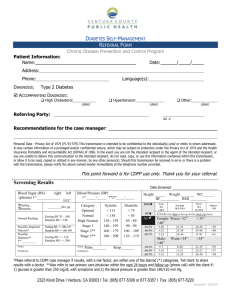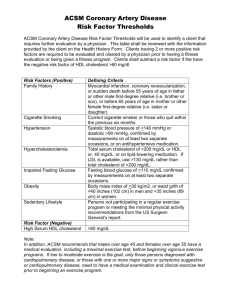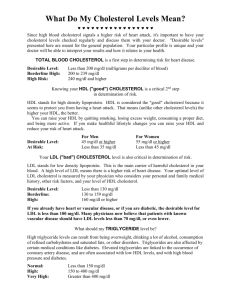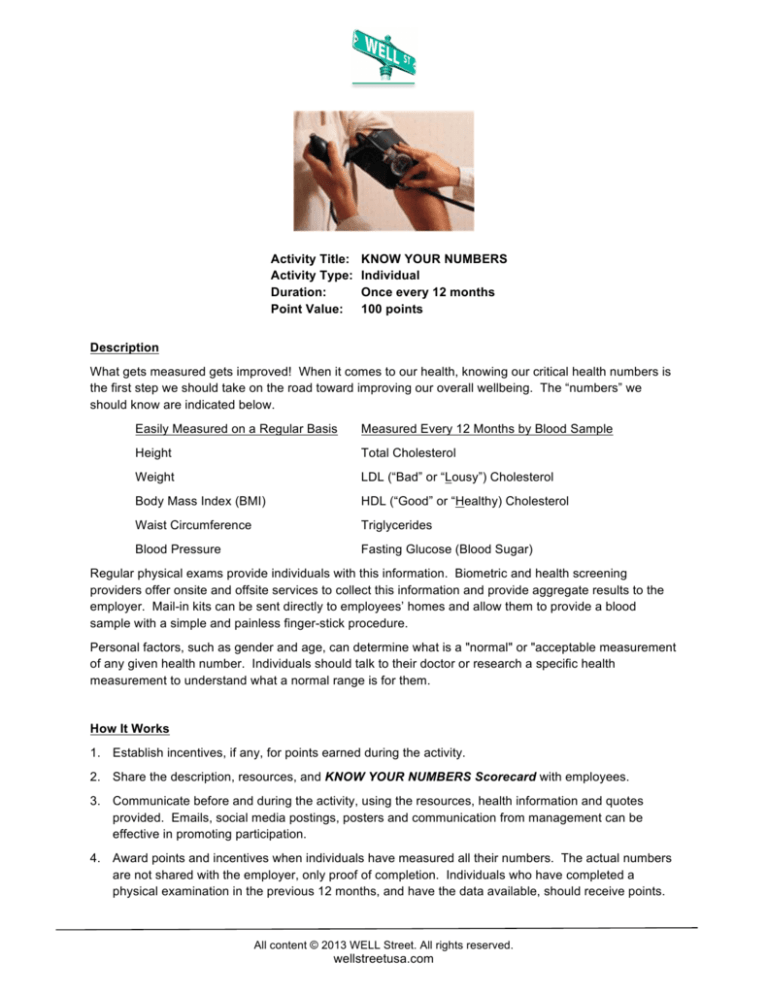
Activity Title:
Activity Type:
Duration:
Point Value:
KNOW YOUR NUMBERS
Individual
Once every 12 months
100 points
Description
What gets measured gets improved! When it comes to our health, knowing our critical health numbers is
the first step we should take on the road toward improving our overall wellbeing. The “numbers” we
should know are indicated below.
Easily Measured on a Regular Basis
Measured Every 12 Months by Blood Sample
Height
Total Cholesterol
Weight
LDL (“Bad” or “Lousy”) Cholesterol
Body Mass Index (BMI)
HDL (“Good” or “Healthy) Cholesterol
Waist Circumference
Triglycerides
Blood Pressure
Fasting Glucose (Blood Sugar)
Regular physical exams provide individuals with this information. Biometric and health screening
providers offer onsite and offsite services to collect this information and provide aggregate results to the
employer. Mail-in kits can be sent directly to employees’ homes and allow them to provide a blood
sample with a simple and painless finger-stick procedure.
Personal factors, such as gender and age, can determine what is a "normal" or "acceptable measurement
of any given health number. Individuals should talk to their doctor or research a specific health
measurement to understand what a normal range is for them.
How It Works
1. Establish incentives, if any, for points earned during the activity.
2. Share the description, resources, and KNOW YOUR NUMBERS Scorecard with employees.
3. Communicate before and during the activity, using the resources, health information and quotes
provided. Emails, social media postings, posters and communication from management can be
effective in promoting participation.
4. Award points and incentives when individuals have measured all their numbers. The actual numbers
are not shared with the employer, only proof of completion. Individuals who have completed a
physical examination in the previous 12 months, and have the data available, should receive points.
All content © 2013 WELL Street. All rights reserved.
wellstreetusa.com
How It Works continued
5. After employees complete the activity, invite them to complete the Activity Survey and share what
they learned in writing. If it is appropriate, and privacy is protected, share positive experiences with
all employees.
Wellness Benefits
•
Measurement of these critical health numbers will establish a base line and, if necessary, encourage
an action plan for improving them
•
Identifies a potential health issue in its early stages, when it can be treated more successfully
•
Reduces the likelihood of future health problems and related costs
•
Engages people in taking charge of their health
•
Contributes to better quality and longer life span
Measureable Outcomes
•
Once the numbers are established, regular measurement of weight, BMI, waist circumference, and
blood pressure provides individuals with ongoing feedback.
•
Annual biometric testing, from a blood sample, provides individuals with a measure of their important
cholesterol, triglyceride and glucose numbers.
•
What percentage of employees participated in the activity?
•
Did people report learning something valuable about their health and wellbeing from the activity?
•
Did people report making personal lifestyle changes because of the activity?
Resources
Blood Glucose
American Diabetes Association (diabetes.org)
“Checking Your Blood Glucose”
Link:
http://www.diabetes.org/living-with-diabetes/treatment-and-care/blood-glucose-control/checkingyour-blood-glucose.html
MedicineNet.com
“Diabetes – What Should My Blood Sugar Levels Be?”
Link:
http://www.medicinenet.com/script/main/art.asp?articlekey=17384
National Diabetes Education Program / National Institutes of Health (ndep.nih.gov)
“Know Your Blood Sugar Numbers”
Link:
http://ndep.nih.gov/publications/PublicationDetail.aspx?PubId=17
WebMD.com (webmd.com)
“Blood Glucose”
Link: http://diabetes.webmd.com/blood-glucose
All content © 2013 WELL Street. All rights reserved.
wellstreetusa.com
Blood Pressure
American Heart Association (heart.org)
“Understanding Blood Pressure Readings”
Link:
http://www.heart.org/HEARTORG/Conditions/HighBloodPressure/AboutHighBloodPressure/Understandin
g-Blood-Pressure-Readings_UCM_301764_Article.jsp
Mayo Clinic (mayoclinic.com)
“Blood pressure chart: What your reading means”
Link:
http://www.mayoclinic.com/health/blood-pressure/HI00043
National Institutes of Health Medline Plus (nim.nih.gov)
“Blood Pressure Numbers: What They Mean”
Link:
http://www.nlm.nih.gov/medlineplus/magazine/issues/winter10/articles/winter10pg10a.html
WebMD.com (webmd.com)
“Know Your Blood Pressure Numbers”
Link:
http://www.webmd.com/hypertension-high-blood-pressure/guide/diastolic-and-systolic-bloodpressure-know-your-numbers
Body Mass Index (BMI)
About.com Sports Medicine (sportsmedicine.about.com)
“BMI – What is BMI or Body Mass Index?”
Link:
http://sportsmedicine.about.com/od/anatomyandphysiology/a/BMI.htm
Centers for Disease Control and Prevention (cdc.gov)
“Body Mass Index”
Link:
http://www.cdc.gov/healthyweight/assessing/bmi/
National Heart, Lung and Blood Institute (nhlbi.nih.gov)
“Assessing Your Weight and Health Risk”
Link: http://www.cdc.gov/healthyweight/assessing/bmi/
“Calculate Your Body Mass Index”
Link: http://www.nhlbi.nih.gov/guidelines/obesity/BMI/bmicalc.htm
WebMD (webmd.com)
“Body Fat Measurement: Percentage vs. Body Mass”
Link:
http://www.webmd.com/diet/features/body-fat-measurement
Cholesterol
eMedicineHealth.com
“Cholesterol Charts (What the Numbers Mean)
Link:
http://www.emedicinehealth.com/understanding_your_cholesterol_level/page3_em.htm
Mayo Clinic (mayoclinic.com)
“Cholesterol levels: What numbers should you aim for?”
Link: http://www.mayoclinic.com/health/cholesterol-levels/CL00001
Start With Your Heart.com
“Understanding Your Cholesterol Numbers”
Link: http://www.startwithyourheart.com/resources/508SWYH_CholesterolConsumerBrochureEnglish.pdf
Yahoo Health (health.yahoo.net)
“Cholesterol: Know Your Numbers”
Link:
http://health.yahoo.net/articles/cholesterol/cholesterol-know-your-numbers
All content © 2013 WELL Street. All rights reserved.
wellstreetusa.com
Know Your Numbers
American College of Cardiology (cardiosmart.org)
“Know Your Numbers”
Link:
https://www.cardiosmart.org/Healthy-Living/Know-your-Numbers
American Heart Association (goredforwomen.org)
“Know Your Health Numbers”
Link: http://www.heart.org/HEARTORG/Conditions/Diabetes/PreventionTreatmentofDiabetes/KnowYour-Health-Numbers_UCM_313882_Article.jsp
BlueCross BlueShield (provider.carefirst.com)
“Know Your Numbers Health Card Tracker”
PDF Link (copy and paste link): https://provider.carefirst.com/wcmresources/ContentEmployers/assets/resource_library/CUT7557.pdf
The Doctor Oz Show (doctoroz.com)
“Dr. Oz's Know Your 5: The Lifesaving Numbers You Need to Know”
Link:
http://www.doctoroz.com/know-your-5-videos/dr-ozs-know-your-5-lifesaving-numbers-you-need-know
Mayo Clinic YouTube Video (youtube.com)
You Tube Video: “Know Your Numbers”
Link: http://youtu.be/kkps4XwvxK4
Our Lady of the Lake Regional Medical Center (ololrmc.com)
“Printable Know Your Numbers Card”
Link:
http://www.ololrmc.com/workfiles/Know-Your-Numbers-Card-PRINTABLE.pdf
She Knows Health & Wellness (sheknows.com)
“Five Health Numbers You Need to Know”
Link:
http://www.sheknows.com/health-and-wellness/articles/809057/five-health-numbers-you-need-to-know
United Healthcare (uhc.com)
Source 4 Women: “Know Your Numbers”
Link:
http://www.uhc.com/source4women/health_topics/general_health/know_your_numbers.htm
WebMD.com (webmd.com)
“Key Numbers for Heart Health”
Link: http://www.webmd.com/heart/features/do-you-know-your-heart-numbers
“Women: Know Your Numbers”
Link: http://women.webmd.com/video/women-health-check-numbers
Waist Circumference
American Cancer Society (cancer.org)
“Study: Larger Waist Size Increases Health Risk”
Link:
http://www.cancer.org/cancer/news/news/larger-waist-size-increases-health-risks
Dummies.com (dummies.com)
“How to Assess Health Risk With Waist Size Measurement”
Link:
http://www.dummies.com/how-to/content/how-to-assess-health-risk-with-waist-size-measurem.html
All content © 2013 WELL Street. All rights reserved.
wellstreetusa.com
Waist Circumference continued
eHow.com (ehow.com)
“How to Measure a Waist”
Link:
http://www.ehow.com/how_2307504_measure-waist.html
RealAge.com (realage.com)
“Waist Management, Not Weight Management”
Link: http://www.realage.com/diet-weight-loss/waist-management-not-weight-management
“Say Goodbye to Belly Flab in 9 Steps”
Link:
http://www.realage.com/health-action-plans/steps-to-a-flatter-belly?src=edit&chan=footer&con=related fbIndex1
U.S. News & World Report – Health (health.usnews.com)
“For Good Health, Watch Your Waist Size, Not Just Your Weight”
Link:
http://health.usnews.com/health-news/diet-fitness/heart/articles/2010/08/10/for-good-health-watch-yourwaist-size-not-just-your-weight
Additional Ideas
1. Invite speakers in throughout the year to speak about the benefits of keeping abreast of your health
numbers.
2. Invite speakers in to address specific health topics related to health numbers, e.g., diabetes,
hypertension, cholesterol levels, weight management etc.
3. Provide information and reminders of age appropriate screenings throughout the year.
4. Host a “Know Your Numbers Health Fair” that provides education and screenings from carefully
selected vendors.
5. Arrange special discounts with local healthcare providers for health screenings.
6. Provide employees with an annual onsite physical and health risk assessment at no charge.
7. Anonymously share improvements made in people’s health numbers during and after the activity.
One-Day Challenges
1. Host a “Know Your Numbers Challenge”. Reward everyone who gets his or her height, weight, (and
resulting BMI), waist size, body fat and blood pressure measured by a health professional.
2. Conduct a “Testimonial Challenge” near the end of the challenge. Invite employees to share how
they improved their numbers over the course of the challenge. If preferred, this can be done
anonymously.
3. Participate in the “Know Your Numbers Health Fair” that provides a measurement of height, weight
(and resulting BMI), body fat, waist size, blood pressure and a blood draw for biometric data.
4. Offer a “Lunch-n-Learn Challenge”. Invite a health professional to speak to attendees on the benefits
of knowing your health numbers.
Quotes
1. “Health is the thing that makes you feel that now is the best time of the year.” – Franklin P. Adams
2. “Quit worrying about your health. It will go away.” – Robert Orben
All content © 2013 WELL Street. All rights reserved.
wellstreetusa.com
Quotes continued
3. “We know a great deal more about the causes of physical disease than we do about the causes of
physical health.” – M. Scott Peck
4. “The preservation of health is a duty. Few seem conscious that there is such a thing as physical
morality.” – Herbert Spencer
5. “Effective health care depends on self-care; this fact is currently heralded as if it were a discovery.” –
Ivan Illich
6. “No matter how old you are, no matter how much you weigh, you can still control the health of your
body.” – Mehmet Oz
7. “Looking after my health today gives me a better hope for tomorrow.” – Anne Wilson Schaef
8. “The power of community to create health is far greater than any physician, clinic or hospital.” – Mark
Hyman
9. “You don't have to be a wreck. You don't have to be sick. One's aim in life should be to die in good
health. Just like a candle that burns out.” – Jeanne Moreau
10. “It's never too late to take your heart health seriously and make it a priority.” – Jennie Garth
11. “You can't afford to get sick, and you can't depend on the present health care system to keep you
well. It's up to you to protect and maintain your body's innate capacity for health and healing by
making the right choices in how you live.” – Andrew Weil
12. “Prevention is one of the few known ways to reduce demand for health and aged care services.” –
Julie Bishop
13. “I am interested in getting people to use the healthcare system at the right time, getting them to see
the doctor early enough, before a small health problem turns serious.” – Donna Shalala
14. “Make space in your life, space for health and happiness.” – Kris Carr
15. “Like it or not, in the end, it's one's body. It's literally what carries you through life. There's a reason
for the saying, 'If you have your health, you have everything,' and it's true. Old age, disease - these
are the great equalizers.” – Candace Bushnell
16. “Healthy citizens are the greatest asset any country can have.” – Winston Churchill
17. “If we are creating ourselves all the time, then it is never too late to begin creating the bodies we want
instead of the ones we mistakenly assume we are stuck with.” – Deepak Chopra
18. “The art of medicine consists of amusing the patient while nature cures the disease.” – Voltaire
19. “When you have your health, you have everything. When you do not have your health, nothing else
matters at all.” – Augusten Burroughs, Dry
20. “When health is absent, wisdom cannot reveal itself, art cannot manifest, strength cannot fight, wealth
becomes useless, and intelligence cannot be applied.” – Herophilus
21. “He had had much experience of physicians, and said 'the only way to keep your health is to eat what
you don't want, drink what you don't like, and do what you'd druther not'.” – Mark Twain, Following the
Equator: A Journey Around the World
22. “But for one's health as you say, it is very necessary to work in the garden and see the flowers
growing.” – Vincent van Gogh
All content © 2013 WELL Street. All rights reserved.
wellstreetusa.com
Quotes continued
23. “Health is the greatest gift, contentment the greatest wealth, faithfulness the best relationship.” –
Gautama Buddha
24. “Health is the greatest possession. Contentment is the greatest treasure. Confidence is the greatest
friend.” – Lao Tzu
25. “The greatest wealth is health” – Virgil
26. “We should resolve now that the health of this nation is a national concern; that financial barriers in
the way of attaining health shall be removed; that the health of all it's citizens deserves the help of all
the nation.” – Harry S. Truman
27. “Every human being is the author of his own health or disease.” – Gautama Buddha
28. “The secret of health for both mind and body is not to mourn for the past, worry about the future, or
anticipate troubles, but to live in the present moment wisely and earnestly.” – Paramahansa
Yogananda
29. “Each patient carries his own doctor inside him.” – Norman Cousins, Anatomy Of An Illness
30. “Surgeons can cut out everything except cause.” – Herbert M. Shelton
31. “It is well to be up before daybreak, for such habits contribute to health, wealth, and wisdom.” –
Aristotle
32. “No body is worth more than your body” – Melody Carstairs
33. “The doctor of the future will be oneself.” – Albert Schweitzer
Health Facts
From: WebMD.com
“Key Numbers for Heart Health”
Link: http://www.webmd.com/heart/features/do-you-know-your-heart-numbers
Key Numbers for Heart Health
3 numbers that can change your life.
We live our lives by the numbers: phone numbers, PIN numbers, stock market numbers.
But do you know the heart health numbers that could literally save your life? There are three key numbers
you need -- including one surprisingly easy one that could give you a lifesaving preview of your cardiac
risk.
1. Your blood pressure
2. Your cholesterol levels
3. Your waist size
Healthy numbers mean a healthy heart. If you follow a healthy lifestyle -- eat a balanced diet, get regular
exercise, and avoid smoking -- you can even turn bad numbers around.
Small changes can make a big difference, says Lori Mosca, MD, director of the Columbia Center for
Heart Disease Prevention in New York City.
All content © 2013 WELL Street. All rights reserved.
wellstreetusa.com
Health Facts continued
"For every point you raise your HDL -- that's the 'good' cholesterol -- you reduce your risk of coronary
disease by 2%," she says. "So just raising HDL by five points cuts your heart disease risk by 10%!"
When measuring your heart health numbers, don't just look at where you are -- look at where you're
going.
"Trend lines are important," says Mosca. "If your blood pressure is below the cutoff point for high blood
pressure, that's good, but if it's been going up, it's still a concern." On the other hand, if your cholesterol is
high, but on the way down, pat yourself on the back (and keep working out).
Here's a quick guide to your heart-health numbers:
1. Blood Pressure: Key to Heart Health
Your doctor tells you your blood pressure numbers, or you hear the doctors on ER shout "pressure's
dropping!" Do you actually know what that means?
Blood pressure consists of two numbers. Your systolic pressure measures the pressure of blood against
artery walls when the heart pumps blood out during a heartbeat, while the diastolic pressure measures
the same pressure between heartbeats, when the heart fills with blood. "Both of these numbers are
important," says Mosca. "Just because one is normal doesn't mean you're off the hook."
•
•
•
Normal blood pressure is below 120/80.
Pre-hypertension is 120 to 139 (systolic) and/or 80 to 89 (diastolic).
Hypertension – also known as high blood pressure -- is 140 or higher (systolic) and 90 or higher
(diastolic).
One in three adults in the U.S. -- about 74 million people -- have high blood pressure or pre-hypertension.
Between 1996 and 2006, the number of deaths from high blood pressure rose by more than 48%.
2. Cholesterol: Predictor of Heart Attack
Cholesterol isn't all bad -- it's a type of fat that's actually a nutrient. But as you've probably heard, there's
"good" cholesterol and "bad" cholesterol. When we measure cholesterol and blood fats, we're really
talking about three different numbers: HDL, LDL, and triglycerides. They combine to give you a "lipid
profile" score, but the three individual scores are most important.
Here are the numbers to strive for:
•
•
•
•
Total cholesterol of 200 mg/dL or lower.
HDL ("good" cholesterol) of 50 mg/dL or higher, if you're a woman, or 40 mg/dL or higher, if
you're a man.
Optimal LDL is 100 or lower, says Mosca. If you have other major risk factors, like pre-existing
cardiovascular disease or diabetes, your doctor may want your LDL closer to 70.
Triglycerides of less than 150 mg/dL.
LDL is the number most doctors and heart health programs focus on in particular, says Mosca. "Every
single point of LDL decrease makes a difference," she says. "If your LDL is at 140 and you get it down to
130, that's great, even if you haven't reached optimum levels yet."
Adults 20 and older should get a lipid profile every five years.
All content © 2013 WELL Street. All rights reserved.
wellstreetusa.com
Health Facts continued
3. Waist Size: The Connection to Heart Disease
If you can only remember one number, your waist size is the one to know. Why? Because better than
your weight or your BMI, your waist size predicts your heart disease risk, says Mosca. If your waist size is
equal to or more than 35 inches in women and equal to or more than 40 inches in men, it increases your
risk of cardiovascular disease, diabetes, metabolic problems, high blood pressure and abnormal
cholesterol.
It's easy to measure yourself. Just get a non-elastic tape and measure around your belly button.
"If patients lose even 1 inch off their waist, we see improvements in all the other heart health numbers,"
Mosca says. "Conversely, if they gain even 1 inch, we see worsening in those numbers. It's a much better
indicator than weight, because you can be gaining weight and still losing waist size if you're working out
and gaining lean muscle mass."
Special Numbers for People With Type 2 Diabetes
If you have type 2 diabetes, there are two other numbers you need to watch: your blood sugar and your
hemoglobin A1c levels.
•
•
•
A normal fasting blood sugar is less than 100 mg/dL.
Prediabetes is a fasting blood sugar of 100 to 125 mg/dL or an A1c of 5.7%-6.4%
You may have diabetes if your fasting blood sugar is 126 mg/dL or greater or your A1c level is
6.5% or higher – and you've gotten these results two or more times
But because spot glucose checks can vary dramatically, HbA1c levels are a better measure of whether
your diabetes is under control. Here, there has been some controversy.
"Doctors like to see a HbA1c level of less than 7," says Mosca. "But recent research has shown that when
we're more aggressive with diabetics and get the number below 6, they actually have more problems.
We're still learning -- for example, aggressive management in a frail elderly person with a lot of medical
problems may not be the best idea, while in an otherwise healthy young person, it might be. It's important
to talk to your doctor as to what's best for you."
No matter what your numbers, the most important thing to know is that they can all be helped by healthy
lifestyle choices. "Even small changes in your physical activity, your nutrition, and your smoking habits
can have a major impact on your heart health," Mosca says.
All content © 2013 WELL Street. All rights reserved.
wellstreetusa.com
Know Your Numbers
Individual
Scorecard
Date:
#
"Number"
Item
1
Height
2
Weight
3
BMI
4
Waist
5
Blood
Pressure
6
Total
Cholesterol
7
LDL
Cholesterol
8
HDL
Cholesterol
9
Triglycerides
10
Fasting
Glucose
Value
Desired
Range
Value
Desired
Range
Value
Desired
Range
Value
All content © 2013 WELL Street. All rights reserved.
wellstreetusa.com
Desired
Range
Value
Desired
Range
Value
Desired
Range
ACTIVITY SURVEY
Activity Name:
______________________________________________
Final Day of Activity (MM/DD/YYYY):
_____ / _____ / __________
Please rate the statements below by circling the number that best represents your experience.
1 – Strongly Disagree
2 – Disagree
3 – Neither Agree or Disagree
4 – Agree
5 – Strongly Agree
1.
I enjoyed this activity.
1
2.
5
2
3
4
5
2
3
4
5
2
3
4
5
2
3
4
5
2
3
4
5
3
4
5
4
5
I would like to do this again.
1
9.
4
I plan to make personal lifestyle changes because of this activity.
1
8.
3
I learned something valuable about my health and wellbeing from this activity.
1
7.
2
It reduced my stress level.
1
6.
5
It improved my energy level.
1
5.
4
It improved my health.
1
4.
3
It increased my happiness.
1
3.
2
2
The activity improved morale in the workplace.
1
2
3
Please use the back of this page to add comments about your experience.
All content © 2013 WELL Street. All rights reserved.
wellstreetusa.com

